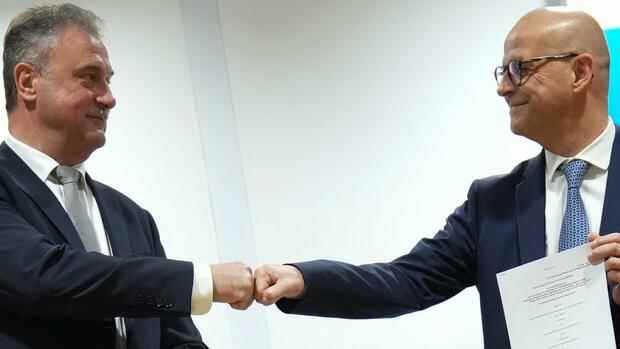Bahn personnel director Martin Seiler (right) and GDL boss Claus Weselsky announce the agreement in the wage dispute.
(Photo: dpa)
Frankfurt After the collective bargaining is before the collective bargaining – this is the formula that could be used to sum up the compromise between the train drivers’ union GDL and Deutsche Bahn. No sooner had the agreement been reached than the rival union EVG spoke up. Their boss, Klaus-Dieter Hommel, announced that he wanted to present a catalog of demands to the railways: “We are preparing for negotiations, but also for measures up to and including labor disputes.”
For Martin Seiler, Head of Human Resources at Deutsche Bahn, the agreement with the GDL could prove to be a Pyrrhic victory if he did not succeed in getting the larger EVG on board. She had already concluded a crisis collective agreement with Deutsche Bahn last year, which looks different in parts. “I think it is possible that we will come to the relevant rules with the EVG in a timely manner,” says Seiler confidently.
But it shouldn’t be easy. Because while all those involved were still celebrating the wage agreement and a little themselves in Berlin, GDL boss Claus Weselsky continued to fire in the direction of the EVG: “We concluded differently, and higher, visibly higher,” he said. “We spend millions, go on strike, let ourselves be insulted, and at the end of the day we can watch how the collective bargaining agreement is carried out after the others.”
The background to this is a power struggle between the two unions, fueled by the law on collective bargaining. Thereafter, the collective agreement of the union with most of the members applies in the companies.
Top jobs of the day
Find the best jobs now and
be notified by email.
GDL and EVG meet in 71 of the approximately 300 Deutsche Bahn companies. Deutsche Bahn assumes that GDL has a majority in 16 of them. Weselsky has entered into the current collective bargaining dispute with the aim of being able to conclude the contract for all GDL members.
The GDL had to give way on some points
Here the GDL boss had to bow to the legal situation. The qualification is only valid in the 16 companies mentioned. “We will deal with the applicable collective bargaining law,” said Weselsky. But the GDL secured the company pension for all railroaders. “The collective bargaining law applies,” said Seiler. It is clear where which collective agreements apply. At the same time, unlike in the past, the GDL has agreed to disclose the number of members to a neutral notary in order to determine the majority in the individual companies.
GDL and Deutsche Bahn agree
The collective bargaining dispute, which had been deadlocked for weeks, was resolved on Thursday night. The Prime Ministers of Schleswig-Holstein and Lower Saxony, Daniel Günther (CDU) and Stephan Weil (SPD), mediated.
The German Association of Officials, the umbrella union of the GDL and the German Federation of Trade Unions as the umbrella organization of the EVG had asked the politicians for support. For EVG boss Hommel this is an unacceptable interference: “That is a blow to the office of collective bargaining autonomy.”
But the advance brought the solution. The GDL members receive a total of 3.3 percent more wages over a period of 32 months in two steps. There is also a first Corona bonus of 400 to 600 euros this year and another 400 euros in March.
More: GDL boss Weselsky calls railway manager “rivets in pinstripes”
.
